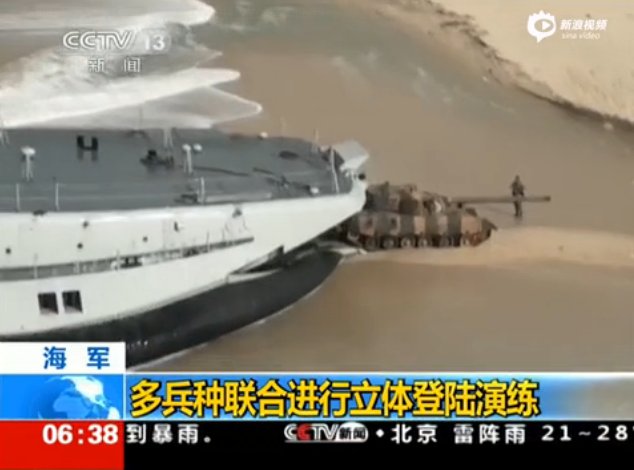


Just as in fields from air defense to anti-submarine warfare, the Chinese Navy has made great gains in the field of amphibious invasion capacity, which it recently demonstrated in military exercises in the South China Sea.
In mid-July, a large amphibious task force of Type 071 landing platform dock (LPD), Type 072 landing ships, and escorting frigates practiced a high-tech landing assault. After preparatory bombardment by cannons, rocket and target shooting of simulated helicopters and drones, the Type 072 landing craft launched ZDB-05 infantry fighting vehicles, the world’s fastest amphibious armored vehicles, to storm the beaches. Overhead, PLANMC marines deployed from Z-8 transport helicopters, flown from the Type 071 LPD, to seize positions behind simulated enemy lines.

The two platforms key to Chinese amphibious operations are the Zubr and the Type 726 Yuyi Landing Craft Air Cushioned (LCAC) hovercrafts. Compared to traditional landing craft, which can access only 15 percent of the world’s coastline (mostly beaches), hovercraft float on a cushion of air, allowing them to access 70 percent of the world’s coastlines.

The Zubr hovercraft, designed by Soviet engineers, is the world’s largest and most heavily armed combat hovercraft. It has an impressive 40 knot speed and 300 mile range, which creates wide options for assault planners. While armed with 30mm Gatling cannons and 140mm rocket artillery, the Zubr’s most deadly asset is its 150 tons of cargo, which in the war game carried ZTZ-96 main battle tanks. This gives Chinese marines a heavy punch of tanks to shock and smash enemy coastal defenses. To date, China has purchased two Ukrainian Zubrs and license-produced two more.

Yuyi LCACs are just as important. While Type 05 IFVs provide the first wave of troops to take the beachhead, the 60 knot, 60 ton payload Yuyi, a 21st century answer to the Higgins Boat of “Operation Overlord” fame, carries the bulk of infantry needed to exploit the breakthrough on the beach. During the exercise, the Yuyi blitzed out of the Type 071’s well deck and onto the relatively safer beach after the initial landing, unleashing a company of PLAN marines.

China’s wargames show its interest not just in new technology but in integrating cross platform operations to address the difficult problem of large, contested amphibious landings. The next step will be to bring the PLAAF, PLA and 2nd Artillery onboard to provide support like air superiority, long range missile strikes and cyber attacks in support of amphibious combat. With strategic Chinese interests increasing from Asia to Africa, the Middle East and Latin America, such growing capabilities matter not just in the South China Sea and Taiwan Straits, but may ripple beyond to more distant waters.
You may also be interested in:
Chinese Cargo Ships Get the Military Option
Mission from Crimea: 2nd Zubr Hovercraft Delivered to China
